Chapter 8 Industries
Textbook Questions and Answers
1. Mark ✓ in the box next to the right alternative:
(Note: The answers are given directly.)
Question A.
Which factors among those mentioned below does not directly impact industrial development?
(i) Water [ ]
(ii) Electricity [ ]
(iii) Labour [ ]
(iv) Air [ ]
Answer:
(iv) Air [✓]
Question B.
Which of the following is a small industry?
(i) Machine parts industry [ ]
(ii) Book binding industry [ ]
(iii) Silk industry [ ]
(iv) Sugar industry [ ]
Answer:
(ii) Book binding industry [✓]
Question C.
Which of the following cities is not an IT centre?
(i) Old Delhi [ ]
(ii) New Delhi [ ]
(iii) Noida [ ]
(iv) Bangaluru [ ]
Answer:
(i) Old Delhi [✓]
Question D.
An amount of 2% of the profits have to be utilized for which purpose by industries?
(i) Income tax [ ]
(ii) Corporate social responsibility [ ]
(iii) Goods and service tax [ ]
(iv) Sales tax [ ]
Answer:
(ii) Corporate social responsibility [✓]
2. State whether the following statements are true or false. Correct the incorrect Statements.
Question a.
Small and medium industries of a country are harmful to heavy industries.
Answer:
Incorrect.
Correct sentence: Small and medium industries of a country are supportive to heavy industries.
Question b.
The level of industrialization is an indicator of the economic development of a country.
Answer:
Correct.
Question c.
The aim of the industrial development corporations is to decentralize industrialization.
Answer:
Correct.
Question d.
Corporate social responsibility is compulsory for every industries.
Answer:
Incorrect.
Correct sentence: Corporate social responsibility is not compulsory for every industries.
3. Answer the following questions in three to four lines.
Question a.
What are the facilities provided by the government to industrial estates?
Answer:
The following are the facilities provided by the government to industrial estates:
- Government gives concessional rates to the estates for electricity, water and taxes.
- Estates are also provided piece of land at concessional rates by the government.
Question b.
Write in your words how industrial development impacts national development.
Answer:
- Industrial development generates employment opportunities.
- Due to increased employment level, people get jobs and per capita income increases. This further increases the standard of living of people.
- Industrial development increases the value of the Gross National Product.
- Industrial development increases the production of various goods. By exporting the surplus goods, country can earn foreign exchange. In this way, industrial development positively impacts national development.
Question c.
Give your opinion in short on the usefulness of corporate social responsibility.
Answer:
1. Corporate social responsibility is responsibility shown by the industrialists by working for the betterment of the society and for conserving environment.
2. Industries making annual profit of more than 5 crores are expected to spend 2% of their profits on some of the following acts:
- Providing educational or health facilities
- Establishing centres for mentally or physically challenged, widows, other needy people
- Developing a particular village or region
- Establishing environmental development centres, etc.
3. Corporate social responsibility increases the welfare of people and so proves beneficial to the society.
Question d.
Mention three features of small industries.
Answer:
Three features of small industries ! are as follows:
- Small industries require comparatively less amount of inputs like capital, machinery and manpower.
- Small industries require comparatively less premise for its day-to-day operations.
- Generally, the goods produced in small industries have local/regional markets.
4. Write detailed answers to the following questions.
Question a.
Explain the factors affecting industrial development.
Answer:
The factors affecting industrial development are as follows:
1. Scientific and technological advancement, quantity and quality of labour, speedy transportation facilities, ready markets, availability of raw materials, government policies, political stability, etc. are factors that influence the industrial development of a nation.
2. For example, dense forest areas, mountainous areas, desert regions have extreme physiographical features. Transport facilities are found to be limited in such regions. Therefore, industrial development is found to be limited in such regions.
3. For example, agriculture is developed on a large scale in the fertile plains and the regions of moderate rainfall. Agriculture provides raw materials to many industries. Therefore, industrial development is found to be high in such regions.
Question b.
State the advantages of the Maharashtra Industrial Development Corporation.
Answer:
The advantages of the Maharashtra Industrial Development Corporation are as follows:
- The state government of Maharashtra established Maharashtra Industrial Development Corporation (MIDC) on 1st August, 1962.
- Through MIDC, government has set up industries in all districts of Maharashtra. MIDC supports the industrial growth and decentralization of industries.
- Government gives concessional rates to the estates/industries for electricity, water and taxes. Estates/industries are also provided piece of land at concessional rates by the government.
- MIDC has been playing an important role in generating employment opportunities in all the 36 districts of Maharashtra.
- MIDC has been playing an important indirect role in increasing the per capita income and standards of living of people in Maharashtra.
Question c.
Explain the importance of I.T. industry.
Answer:
1. Information technology industry includes various components like searching for technical information, obtaining information, analyzing information, compiling information, graphic presentation of information and providing information.
2. Information technology industry provides various types of information through internet on computers, mobiles and other devices. This industry provides information at comparatively less cost, time and efforts.
3. The obtained information can be used for personal, economic, social, cultural, etc. development. India has made rapid progress in this industry.
Question d.
Considering India’s population, the development of industries is a good solution to the problem of unemployment. Explain.
Answer:
1. According to Census, 2011, the population of India was nearly 121 crores.
2. In India, majority of people are engaged in agriculture. In India, agriculture is seasonal in nature. Therefore, the unemployment rate is found to be high in India. Therefore, it is essential to develop industries in India.
3. By developing small industries, unemployed people will get employment opportunities. Small industries will help in providing jobs to less skilled, less educated people.
4. By developing medium and large industries in rural areas, the process of urbanisation can be boosted in villages. It will also restrict migration of people from villages to towns and cities. The employment level in a nation can be raised by developing industries. Thus, considering India’s population, the development of industries is a good solution to the problem of unemployment.
5. Prepare a flow chart for the following statements:
Question a.
The journey of clothes we use from the farm to ourselves.
Answer:
Question b.
Essential factors for the location of any one industry.
Answer:
6. Highlight the differences.
Question a.
Medium industries and heavy industries.
Answer:
Question b.
Agro-based industries and Information technology industries.
Answer:
Projects:
Collect information about any one project undertaken in your village/city under the Corporate Social Responsibility and present it in the class.
Additional Important Questions and Answers
Mark ✓ in the box next to the right alternative:
Question A.
Which of the following is a medium industry?
(i) Sugar industry [ ]
(ii) Textile industry [ ]
(iii) Cement industry [ ]
(iv) Food processing industry [ ]
Answer:
(iv) Food processing industry [✓]
Examine the following statements and correct the incorrect ones:
Question a.
Localization of sugar industry is found near Jamshedpur.
Answer:
Incorrect.
Correct sentence: Localization of iron and steel industry is found near Jamshedpur.
Question b.
India is predominantly manufacturing country.
Answer:
Incorrect.
Correct sentence: India is predominant¬ly agrarian country. ,
Question c.
Poverty decreases the speed of industrial growth.
Answer:
Correct.
Answer the following questions in one sentence each:
Question a.
What is manufacturing?
Answer:
The process of converting raw materials into finished goods is called manufacturing. ‘
Question b.
What is called factory?
Answer:
A place where raw materials are converted into finished goods is called a factory.
Answer the following questions in brief:
Question a.
Mention three features of large industries.
Answer:
Three features of large industries ; are as follows:
- Large industries require huge amount of inputs like capital, machinery and manpower.
- Large industries require huge premise for its day-to-day operations.
- The goods produced in large industries have wide markets.
Answer the following questions in detail:
Question a.
Give information about agro-based industries in India.
Answer:
1. India is predominantly agrarian country. Agriculture is the main occupation of majority of people in India.
2. In India, food crops, cash crops, fruits, flowers, vegetables, etc. are cultivated on a large scale. The agricultural produce provides raw material to many industries in India. For example, sugar cane is raw material for sugar industry. Thus many industries in India are agro-based industries. RIES 83
3. The industries processing agricultural products like fruit processing industries, food processing industries, dairy industries, etc. have also flourished in India.
5. Agro based industries play an important role in rural economy by generating employment opportunities in rural areas.
Highlight differences/Distinguish between the following:
Question a.
Small industries and Medium industries.
Answer:

Study the following map/figure/graph and answer the following questions:
Can you tell?
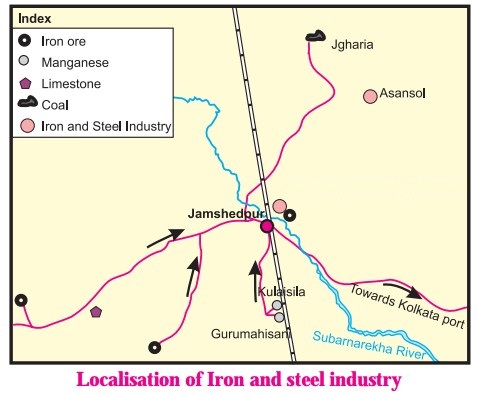
Study the Figure and answer the following questions :
Question a.
Name the industry at Jamshedpur.
Answer:
The name of the industry at Jamshedpur is Iron and steel industry.
Question b.
Which raw material is required for this industry?
Answer:
Raw material required for this industry is iron, manganese, limestone, coal, etc.
Question c.
From which areas is this raw material obtained?
Answer:
This raw material is obtained from the areas of Jamshedpur, Kulaisila, Gurumahisani, Jgharia, etc.
Question d.
Why is coal used in this industry?
Answer:
Coal is used in this industry as fuel to heat iron to a certain temperature.
Question e.
State with reasons if it would be feasible to set up an iron and steel industry in your district.
Answer:
It would not be feasible to set up an iron and steel industry in our district as there are no reserves of iron ore, manganese, limestone, etc. found in our district.
(Note : Students, here it is assumed that you stay in Thane district. Write answer to j the above question as per the district in which you live.)
Give it a try.
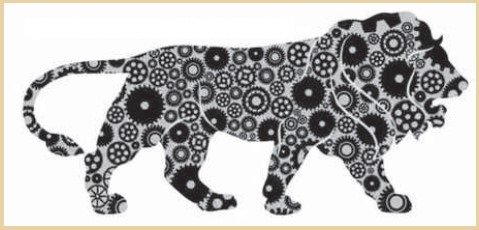
Observe the picture and answer the following questions:
Question a.
In what context is this logo?
Answer:
This logo is about ‘Make in India’ programme.
Question b.
What will be the benefit of this programme?
Answer:
This programme will boost the production of various industries located all over India.
Question c.
What is correlation between this programme and employment?
Answer:
This programme will generate employment opportunities on a large scale.
Question d.
Which are the Navratna industries in India?
Answer:
The Navratna industries in India are as follows :
- Gas Authority of India
- Bharat Heavy Electricals Limited
- Coal India Limited
- Indian Oil Corporation Limite
- National Thermal Power Corporation
- Oil and Natural Gas Corporation, etc.
Question e.
Why do you think they have been accorded this status of Navratna?
Answer:
Navratna industries have been accorded the status of Navratna to function effectively to fulfill various needs of public.
Show the following details on the outline map of India with index:
Give it a try. (Textbook page 58)
Question a.
Important information technology centres are called IT hubs. Find out with the help of the internet in which cities such hubs have developed and mark them on an outline map of India.
Answer:
Important information technology centres known as IT hubs:
- Bangaluru
- Hyderabad
- Chennai
- Mumba
- New Delhi
- Pune
- Kolkata
- Ahmadabad.

Thought-Provoking Questions:
Let’s recall.
1. In Figure, the sequence of two industrial processes has been given. Arrange the pictures in proper sequence and write the sequential number in the boxes given below and answer the following questions:

Questions:
Question a.
Name the two industries.
Answer:
The two industries are:
- Sugar industry
- Textile industry.
Question b.
Name the raw material and the finished product of both these industries.
Answer:
The raw material and finished product in sugar industry are sugarcane and sugar respectively. Similarly the raw material and finished product in textile industry are cotton and cloth.
Question c.
How is the raw material converted into the finished product?
Answer:
The raw material is converted into the finished product by processing the raw material at various level.
Question d.
Why is it necessary to convert the raw material into finished goods?
Answer:
The raw material in its original form, cannot satisfy human wants directly. Therefore it is necessary to convert the raw material into finished goods.
2. Study the following figure showing the factors affecting the location of an industry. Taking into account the factors shown in the figure, note in different colours the favourable factors required for (1) Iron and steel (2) Textiles and (3) Sugar industry and answer the following questions:
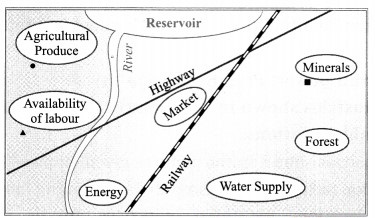
Questions:
Question a.
For each industry, prepare a list of necessary factors.
Answer:
A list of necessary factors for each industry:
- Iron and steel industry: Iron ore, manganese, coal, water, etc.
- Textile industry: Cotton, transportation services, water, electricity, etc.
- Sugar industry: Sugar cane, water, electricity, etc.
Question b.
For each industry give an explanation for the location suggested by you.
Answer:
1. Iron and steel industry: The raw material of iron and steel industry is bulky in nature. The transportation of this raw material is not feasible. Therefore, the location of iron and steel industry is suggested near mineral field.
2. Textile industry: The raw material of textile industry is cotton. Cotton is light in weight. Therefore, it can be transported easily. Therefore, the location of textile industry is suggested near highway and at a place where labours are available.
3. Sugar industry: The raw material of sugar industry is sugar cane. This raw material is comparatively less durable. Therefore, its transport at a distant location is difficult. Therefore, the location of sugar industry is suggested near the cultivation area.
Question c.
In a similar manner for which other industries can you decide a suitable location?
Answer:
In a similar manner, a suitable location can be decided for the industries like fruit processing industry, cement industry, etc.
Give it a try.
Study the factors given below and state which industries could develop in these regions:
Question a.
Excellent transport facilities, skilled labours, uninterrupted supply of electricity,
Answer:
Textile industries, vehicle manufacturing industries, fertilizer manufacturing industries, etc. could develop in the regions of excellent transport facilities, skilled labours, uninterrupted supply of electricity.
Question b.
Limestone deposits, cheap labour, uninterrupted supply of water and electricity, increasing urbanisation,
Answer:
Mining industries could develop in the regions of limestone deposits, cheap labour, uninterrupted supply of water and electricity, increasing urbanisation.
Question c.
Fruit orchards, labour, excellent transportation facilities, unlimited water supply, uninterrupted electricity and ready market.
Answer:
Fruit processing industries could develop in the regions of fruit orchards, labour, excellent transportation facilities, unlimited water supply, uninterrupted electricity and ready market.
Use your brainpower!

Question a.
Identify the industries shown in the pictures given on page 54 of the textbook and state their suitable locations.
Answer:
A. The industries shown in the pictures given on page 54 of the textbook are as follows:
- Information technology industry
- Fish canning industry
- Milk industry.
B. The suitable locations for these industries are as follows:
- Information technology industry: A place connected with transportation facilities
- Fish canning industry: A place near coastal region
- Milk industry: A place near the cattle rearing is practised.
Think about it.
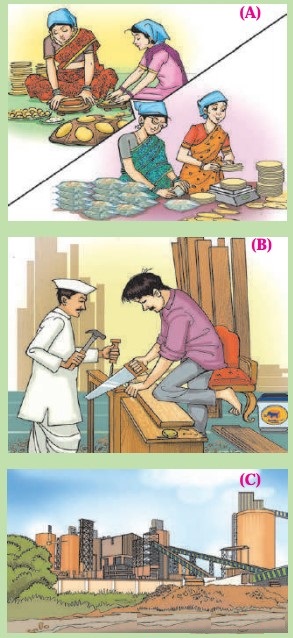
Examine pictures (A), (B) and (C) given on page 54 of the textbook and answer the following questions:
Question a.
Name the industry shown in picture (A).
Answer:
The name of the industry shown in picture (A) is Papad making industry.
Question b.
What is the difference between the industries shown in pictures (A) and (B)?
Answer:
(A) Industry requires comparatively less amount of capital, manpower, machinery and space. On the other hand, (B) industry requires comparatively more amount of capital, manpower, machinery and space.
Question c.
What is distinctive about the industry in picture (C)?
Answer:
The industry in picture (C) requires capital, manpower, machinery and space on a very large scale.
Question d.
Identify the industry shown in each picture.
Answer:
The industries shown are as follows:
- Industry shown in picture (A) is Small industry
- Industry shown in picture (B) is Medium industry
- Industry shown in picture (C) is Large industry
Question d.
Name some more similar industries.
Answer:
- Small industries: Cane products and handicraft industry, earthen pot making industry, etc.
- Medium industry: Fruit processing industry, jaggery making industry, etc.
- Large industry: Sugar manufacturing industry, fertilizer manufacturing industry, Automobile manufacturing industry, etc.
Give it a try.
Question a.
Complete the following list with reference to industries:
(Note: The answer is given directly.)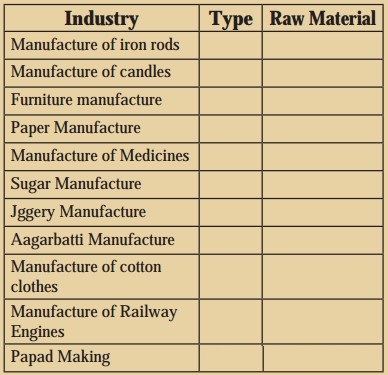
Answer:
| Industry | Type | Raw material |
| 1. Manufacture of iron rods | Large industry | Iron, water, electricity, etc. |
| 2. Manufacture of candle | Small industry | Wax, water, mould, etc. |
| 3. Furniture manufacture | Medium industry | Wood, saw, polish, etc. |
| 4. Paper manufacture | Medium industry | Pulp, water, colour, etc. |
| 5. Manufacture of medicines | Large industry | Medicinal chemicals, water, etc. |
| 6. Sugar manufacture | Large industry | Sugar cane, water, electricity, etc. |
| 7. Jaggery manufacture | Medium industry | Sugar cane, water, etc. |
| 8. Agarbatti manufacturing | Small industry | Bamboo sticks, incense powder, etc. |
| 9. Manufacture of cotton cloth | Large industry | Cotton, water, colour, etc. |
| 10. Manufacture of railway engines | Large industry | Iron, steel, glass, etc. |
| 11. Papad making | Small industry | Pulse tour, salt, water, etc. |
Can you tell?
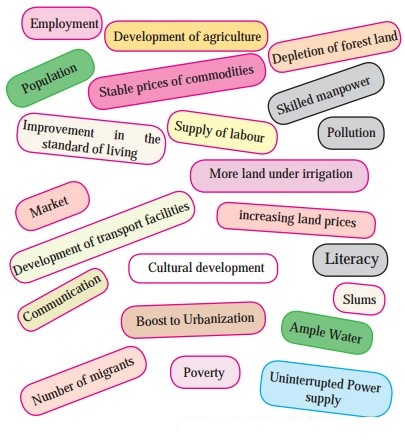
Question a.
Study the factors given in Figure 8.7 given on page 56 of the textbook and classify them as per their advantages and disadvantages in relation to industry:
Answer:
1. Advantages in relation to industry: Employment, Development of agriculture, Population, Stable prices of commodities, Skilled manpower, Improvement in the standard of living, Supply of labour, the Market, More land under irrigation, Development of transport facilities, Communication, Cultural development, Literacy, Boost to urbanization, Ample water, Uninterrupted power supply.
2. Disadvantages in relation to industry: Depletion of forest land, Pollution, Increasing land prices, Slums, Number of migrants, poverty.
Think about it.
Question a.
Talk about the interrelationship between human resource and industry.
Answer:
- The optimum level and high quality of human resource increases the industrial growth.
- Shortage and low quality of human resource decreases the industrial growth.
Use your brainpower!
Question a.
Which type of industries can stem the flow of people towards urban areas?
Answer:
Large industries can stem the flow of people towards urban areas.
Question b.
Where is it necessary to establish these industries?
Answer:
It is necessary to establish these industries in rural areas.
Think about it.
Question
If you become an industrialist, which of the following would you do?:
- Only make profits
- Start a second industry from the earlier one as a supplementary industry
- Will spend some amount for the society after the deduction of tax
- Provide help for the creation of new industrialist.
Answer:
If become industrialist, will do the following:
- Start a second industry from the earlier one as a supplementary industry
- Will spend some amount for the society after the deduction of tax
- Provide help for the creation of new industrialist.
Open-Ended Question:
Use your brainpower!
Question 1.
Which industries could be profitably set up in your surrounding area/locality?
Answer:
As fruits like mangoes, jackfruits, cashew nuts are largely grown, the fruit processing industries could be profitably set up in our surrounding area/locality.
(Note: Students here it is assumed that you live in Sindhudurg district of Maharashtra.
Write answer to the above question as per the district in which you live.)
